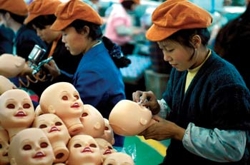| |
|
As a result, 423 factories had their certificates revoked, 341 suspended and a further 690 were ordered to renovate their manufacturing facilities and improve product quality within a set period of time. Apparently the number of factories with quality problems is appallingly high. An estimated 80 percent of the toys on the global market (60 percent on the German market) come from this booming area. These figures are quite alarming: In the near future almost half of the toys in demand on the global market will no longer be available at short notice, short in supply or cannot be supplied at all. Let alone the consequences for the upcoming Christmas season. According to "China Daily" the factories are banned as of September this year, so restrictions have already come into effect. During the last few months problems with Chinese products – and toys in particular – had again and again come into focus. In the USA more than 20 million toys ‘Made in China’ had been recalled due to noxious effects, most recently Halloween-teeth with high lead levels. And also Europe had seen many product recalls this year. The USA and the European Commission are currently preparing stricter regulations, high quality standards and export restrictions. In the meanwhile, Beijing desperately tries to stop negative headlines. Lately, the government arrested 774 suspects involved in production or sales of substandard food, drugs and farm produce. In July, Zheng Xiaoyu, the former director of the State Food and Drug Administration, was executed. "This is a special war to protect the safety and interests of the general public, as well as a war to safeguard the 'Made in China' label and the country's image," Vice-Premier Wu Yi told at the beginning of the national safety campaign. But latest news on the inspections only confirm greatest worries among Western consumers and is a slap in the face of all those companies that placed their trust in the label ‘Made in China’. Today, toy import companies can no longer afford to rely on lax controls and low production costs alone and prices for toys ‘Made in China’ will certainly rise. This might the long awaited great chance for quality toys "Made in Germany"... |
 Numerous Chinese toy manufacturers have been banned from export in the course of a new campaign to ensure quality of toys, food, beverage and other products in China. Most of the companies are based in the booming Guangdong area in South China. According to "China Daily" the Chinese government spent 15 million Yuan ($1.9 million US $) and dispatched more than 200,000 officials in August this year.
Numerous Chinese toy manufacturers have been banned from export in the course of a new campaign to ensure quality of toys, food, beverage and other products in China. Most of the companies are based in the booming Guangdong area in South China. According to "China Daily" the Chinese government spent 15 million Yuan ($1.9 million US $) and dispatched more than 200,000 officials in August this year.